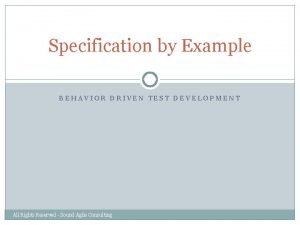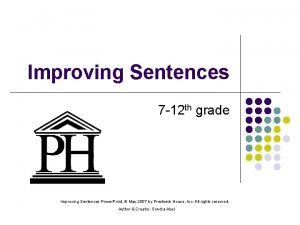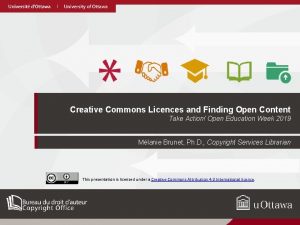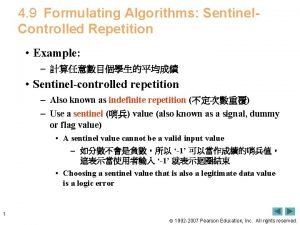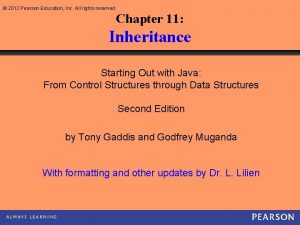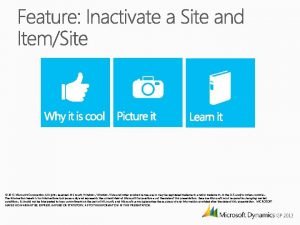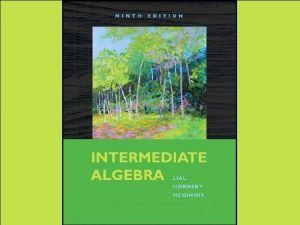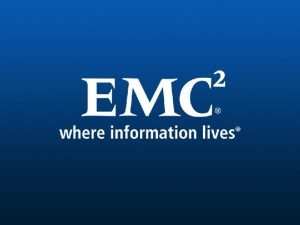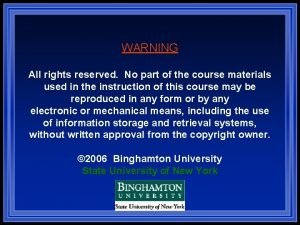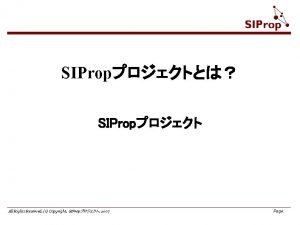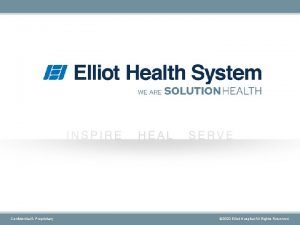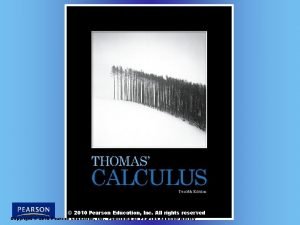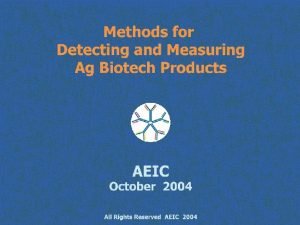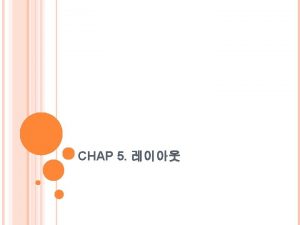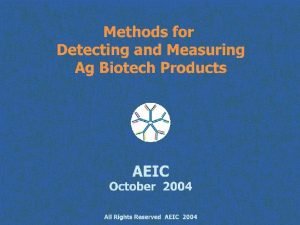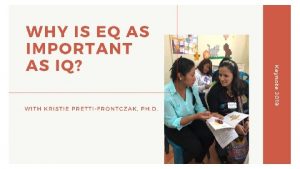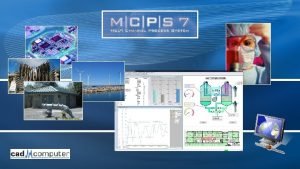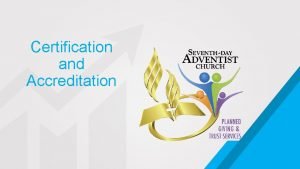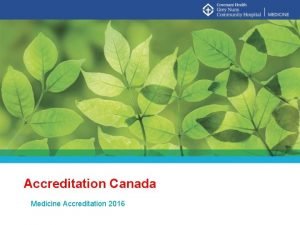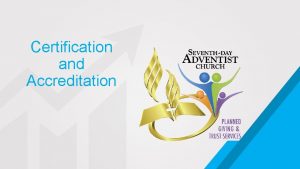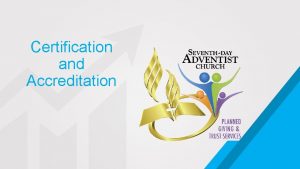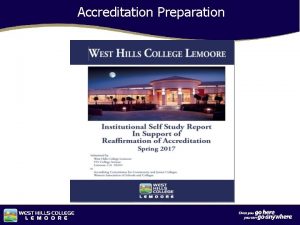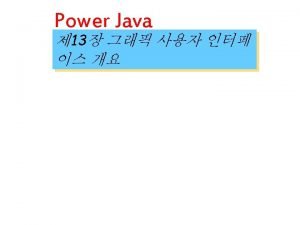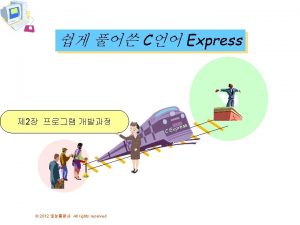Applied Scholastics International All Rights Reserved School Accreditation




















- Slides: 20


© Applied Scholastics International. All Rights Reserved.

School Accreditation What it is… • A private non-profit organization • A self-study and improvement plan • A marketing benefit What it’s not… • A government agency • Demand that all teachers are credentialed • A threat to your organization © Applied Scholastics International. All Rights Reserved.

Why Accreditation? • Certification to the public that the school is a trustworthy institution of learning • Validates the integrity of a school’s program and student transcripts • Fosters improvement of the school’s programs and operations to support student learning • Assures a school community that the school’s purposes are appropriate and being accomplished through a viable educational program • A way to manage change through regular assessment, planning, implementing, monitoring and reassessment • Accreditation is used as a “seal of approval” by parents of a school’s quality and viability. © Applied Scholastics International. All Rights Reserved.

National Accreditation • NIPSA National Independent Private Schools Association www. nipsa. org • NCPSA National Council for Private School Accreditation www. ncpsa. org • Accreditation International www. aiacredits. org also for US schools © Applied Scholastics International. All Rights Reserved.

Regional Accreditation Associations There are six regional accreditors involved in education accreditation in the United States. For California Private Schools: Western Association of Schools & Colleges (WASC) www. acswasc. org • One of six regional accrediting associations in the US • Provides assistance to schools located in California, Hawaii, Guam, the Commonwealth of the Northern Marianas, American Samoa, the Federated States of Micronesia, the Republic of the Marshall Islands, Fiji, and East Asia. © Applied Scholastics International. All Rights Reserved.

Regional Accreditation Associations Middle States Association of Colleges and Schools (MSA) www. ces-msa. org • works with public and private schools serving elementary-age • New York, New Jersey, Pennsylvania, Delaware, Maryland, the District of Columbia, Puerto Rico, and the US Virgin Islands • also works with schools in the mid-East, near-East, Africa, and Europe New England Association of Schools and Colleges (NEASC) http: ///cis. neasc. org • one of four Commissions of the NEASC • accredits private schools in the six states of New England • Schools served include traditional boarding and day preparatory schools, private elementary schools, schools serving students with special needs, and religiously affiliated schools © Applied Scholastics International. All Rights Reserved.

Regional Accreditation Associations • North Central Association of Colleges and Schools (NCA-HLC) www. ncacasi. org • Southern Association of Colleges and Schools (SACS) www. sacs. org Both use: • Accreditation by Advanc. ED www. advanc-ed. org • Northwest Commission on Colleges and Universities (NWCCU) not for K-12 © Applied Scholastics International. All Rights Reserved.

Accreditation: Step One Accreditation: Step 1 • • Self-Study: voluntary process self-study and documentation articulate philosophy analyze and appraise your school’s organization, staff, facilities and instruction © Applied Scholastics International. All Rights Reserved.

Accreditation: Step Two Objective Evaluation: • Visited and evaluated by team of experienced educators • Validators verify findings of self-study • Offer recommendation and commendations © Applied Scholastics International. All Rights Reserved.

Accreditation: Step Three Action Plan • plan for improvement • with timelines, resources, and measured success © Applied Scholastics International. All Rights Reserved.

Accreditation: Step Four © Applied Scholastics International. All Rights Reserved.

What are they looking for? • Defining appropriate educational goals and providing educational programs to achieve them • Maintaining a qualified faculty and an effective school organization • Assessing outcomes of the school experiences and controlling quality • Providing for the continuity of programs and planning for their future • Describing the content of its services and programs • Developing plans and activities for continuous school improvement © Applied Scholastics International. All Rights Reserved.

Advice from: Applied Scholastics Academy of the Valley, an accredited school • Estimate the Effort: Start Early • Read accreditation reports from other schools • Follow the Timelines given © Applied Scholastics International. All Rights Reserved.

Advice from: Applied Scholastics Academy of the Valley • Delegate • Involve Everyone • Be Financially Viable • Really do the steps © Applied Scholastics International. All Rights Reserved.

Applied Scholastics Academy of the Valley • Understand the viewpoint of the accrediting team • Don’t oversell • Answer the Questions • Bridge Understanding © Applied Scholastics International. All Rights Reserved.

Positioning “The unfamiliar is rapidly introduced or communicated by comparing it to a familiar. ” L. Ron Hubbard Positioning, Philosophic Theory Grateful Acknowledgment is made to L. Ron Hubbard Library for permission to reproduce a selection from the copyrighted works of L. Ron Hubbard. © Applied Scholastics International. All Rights Reserved.

Applied Scholastics Academy of the Valley How to Present Study Technology • Positioning Study Technology -Your curriculum is what you teach -Study Technology is how you teach it • Communicate with Reality -Use Learning How to Learn to show what Study Technology is -Point out examples of students or teachers applying Study Technology • Send a copy of the relevant materials before the visits -Study Skills for Life or Learning How to Learn are appropriate -The Way to Happiness, as appropriate • Use Study Technology to achieve the accreditation objectives © Applied Scholastics International. All Rights Reserved.

Become an Evaluator http: //www. acswasc. org/vc_volunteering. htm You can be part of the visiting team: • composed of two to eight members, one of whom is the chairperson • visits range from 1 -day initial visits to 3 - or 4 day full self-study reviews • if you’re an educator and represent educational experience and expertise • training workshops provided What you will do: • review the WASC criteria and study reports from the school to prep for the visit • observes the school in operation and other evidence • reviews student performance data • observes students engaged in learning • talks with administrators, teachers, students, and parents • prepares a report outlining the team’s findings for the school and WASC Commission © Applied Scholastics International. All Rights Reserved.

Acknowledgment • Grateful Acknowledgment is made to L. Ron Hubbard Library for permission to reproduce a selection from the copyrighted works of L. Ron Hubbard. • Applied Scholastics and the Applied Scholastics open book design are trademarks and service marks owned by Association for Better Living and Education International and are used with its permission. • Applied Scholastics International is a non-profit educational organization and does not discriminate on the basis of race, color, religion, national origin, sex, disability, or age in its programs or activities. © Applied Scholastics International. All Rights Reserved.
 Applied scholastics reviews
Applied scholastics reviews All rights reserved example
All rights reserved example Copyright 2015 all rights reserved
Copyright 2015 all rights reserved All rights reserved sentence
All rights reserved sentence Creative commons vs all rights reserved
Creative commons vs all rights reserved Confidential all rights reserved
Confidential all rights reserved Sentinel-controlled loop pseudocode
Sentinel-controlled loop pseudocode Copyright 2015 all rights reserved
Copyright 2015 all rights reserved 2012 pearson education inc
2012 pearson education inc Microsoft corporation. all rights reserved.
Microsoft corporation. all rights reserved. Microsoft corporation. all rights reserved.
Microsoft corporation. all rights reserved. Microsoft corporation. all rights reserved
Microsoft corporation. all rights reserved Pearson education inc. all rights reserved
Pearson education inc. all rights reserved Dell all rights reserved copyright 2009
Dell all rights reserved copyright 2009 Warning all rights reserved
Warning all rights reserved C all rights reserved
C all rights reserved Quadratic equation cengage
Quadratic equation cengage Warning all rights reserved
Warning all rights reserved Confidential all rights reserved
Confidential all rights reserved Microsoft corporation. all rights reserved
Microsoft corporation. all rights reserved 2010 pearson education inc
2010 pearson education inc

